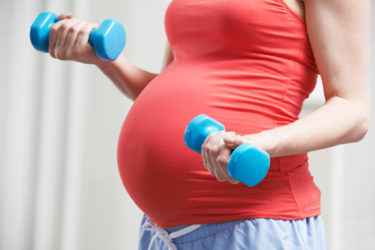You asked and we answered!
Elisha, our Women’s Health Exercise Physiologist, answers all of your questions about what exercise to do, when to do it and how to do it safely.
Q. Is exercise during early pregnancy safe?
A. Yes! But discuss exercise and get clearance from your GP or Obstetrician as soon as you get the good news! It’s not often that the best course of treatment is to avoid all physical activity, but there are certain factors like placenta previa, preeclampsia and hypertension that may contraindicate exercise. If you do have any contraindications, your doctor will advise of the best approach, which may include working with an Exercise Physiologist to ensure your functional activity or exercises are performed safely. Look for an Exercise Physiologist who has further education and experience in prenatal exercise.
If you’ve been cleared, it’s not only safe, but absolutely paramount to exercise while pregnant!
Q. When should I start exercising during pregnancy?
A. Start as soon as possible, even if that means starting in your third trimester (see ‘Is each trimester different?’). It’s always better to start small than to do nothing at all. Be mindful of your capacity. If you’re new to exercise, you may prefer to start with more functional movements. Practicing your body position and control during movements such as climbing stairs, standing up out of a chair, or bending to pick something up off the ground are great ways to increase your physical activity.
If you’re already exercising, be sure to ask about exercise at your first doctor appointment. If you’re an athlete, consider consulting an Exercise Physiologist who will be able to monitor and adapt your training load to preserve your current level of fitness and prepare you for a smoother return to sport postpartum.
Q. Is exercise in each trimester different?
A. In many ways, yes! Your baby is growing and your body is changing to accommodate and prepare you for labour. Rather than focus on each trimester as having different limits, instead think of it as a continuum where each week could be different, each pregnancy is different and not all women experience the same feelings at the same time. Your posture, joint mobility, and comfort with movement will change throughout the continuum of the three trimesters. This may even accompany you into the first year or so of motherhood.
 During the first trimester, you may feel nauseous and fatigued or you may be able to complete your usual exercise routine, albeit with a few adaptations. During the second trimester you may notice you posture start to change, which is also going to affect the movements you can do safely during exercise.
During the first trimester, you may feel nauseous and fatigued or you may be able to complete your usual exercise routine, albeit with a few adaptations. During the second trimester you may notice you posture start to change, which is also going to affect the movements you can do safely during exercise.
By the third trimester, you might find that walking up one staircase feels like a marathon, it’s less comfortable bending down and you may have some new aches or pains. Exercise in third trimester has a few tricks: lower intensity may be required, exercise to manage aches and pains might need to become the focus and exercises which increase the risk of torsional aspects on SIJ and Pubic Symphysis, or emphasise prenatal postures, may not be beneficial. Repetitive movements in a deep squat position are not suitable for everyone and lunges or any other movements where your feet are wide apart are usually car-parked for later.
The general rule I discuss with my clients is that you’ll start to feel that things are different and that is a sign to discuss them openly with your health practitioner or Exercise Physiologist.
Q. What’s the best exercise to do while pregnant?
A. There’s absolutely no set “pregnancy exercise program” so the answer will differ on a case by case basis. Exercise during pregnancy is about a lot more than the pelvic floor and Kegels. Quick tip – our pelvic floor is a complex thing with many different muscles which do not work in isolation. Generally, your program should involve exercises which increase your heart rate, improve or maintain your strength and manage the postures which are associated with having a growing bub in your tum. A good exercise program for prenatal health should address your body as a whole and be individualised to you and your pregnancy. If you’re not sure what to do, it’s recommended you seek advice from an Exercise Physiologist for an individualised program.
Q. I already exercise, do I need to change my regular routine during pregnancy?
A. It all depends on what you’re currently doing, what your goals are, and how your body is responding. Factors to consider are any previous pregnancies, postural changes, hormones and injury risk (eg. relaxin). Now that you’re sharing distribution of blood and oxygen, you’ll probably notice changes to your cardiovascular capacity, as well as changes in movement patterns, mobility and body awareness as your shape changes. All of these could impact your comfort and capacity to exercise, so should be taken into consideration. Be mindful of nutrition and hydration too, a dietitian will be able to provide you with specific nutritional advice.
Q. What are the benefits of exercising while pregnant?
A. Where to start! Exercise improves functional capacity for life after birth; don’t underestimate the strength and endurance required for feeding, lifting, carrying and pushing a stroller. I also prescribe exercise to manage aches and pains throughout pregnancy; SIJ or pubic symphysis pain can be managed with the right exercise prescription. Preparing your body for labour by building muscular endurance is another benefit that may be appealing, plus exercising throughout pregnancy makes the return to exercise post-partum easier and optimises body composition.
The benefits don’t stop there – they also reach the baby! If you’ve been diagnosed with Gestational Diabetes, exercise is great for managing blood glucose levels. Improved circulation through your body means increased placental blood flow, so you are delivering all the nutrients to help with optimal growth and health for your baby both in the womb and once they’re out.
Q. Will exercise make labour easier?
A. I wish there was a guaranteed way to make it easier! Exercise can “teach your body what to do” in the same way that you should train for any physical event. Whether your labour is a sprint or a marathon, unfortunately (or fortunately!) there’s no way to specifically train your body for labour because it varies from one pregnancy to the next. Even the second time round your body can respond in a different way. Exercise can help by training the muscular system how to act, improve your breathing mechanics, and increase your pelvic floor awareness – all of which are going to work to your in favour when the time comes. I get a lot of feedback that just the awareness of the pelvic floor pushing vs pulling during effort helped to visualise what to do during labour.
Q. What exercise should I avoid while pregnant?
A. There’s no list of exercises that are specifically dangerous or should be avoided while pregnant, because every pregnancy is different! For example, laying on your back may be uncomfortable for some, but other women may be cleared to do so and can benefit from guided exercises on their back when done under professional supervision. Bounding and impact exercise such as running or jumping aren’t advisable without first consulting your doctor or an Exercise Physiologist. If you’re not sure – listen to your body, stop if something doesn’t feel right and seek guidance from an Exercise Physiologist with experience in prenatal exercise.
Q. Is it dangerous if my heart rate increases too much?

A. There’s a common belief that increasing your heart rate above 140bpm while pregnant should be avoided. Your resting and working heart rate are altered with pregnancy, so I prefer to use a Rating of Perceived Exertion (RPE) as a better indicator of how hard you’re working. As long as you have clearance to exercise, there’s more benefits from maintaining or even improving cardiovascular function with moderate-high intensity exercise. If you are working at a higher intensity, it’s probably not a good idea to do it alone and consider how you prepare, refuel and rehydrate. A dietitian will be the best person to provide specific nutritional advice.
Q. Can exercise cause bleeding or miscarriage?
A. There’s no evidence that exercise can cause bleeding or miscarriage. If pain or bleeding occur, it suggests that something else is going on, which is why it’s so important to discuss exercise with your doctor and get clearance. Listen to your body and if you experience pain or bleeding you should stop and see your doctor immediately.
Q. Number 1 tip for exercise during pregnancy?
A. Do it!! If you don’t know how, ask a professional. Listen to your body. Exercise to address your own goals. And most of all, have fun!

